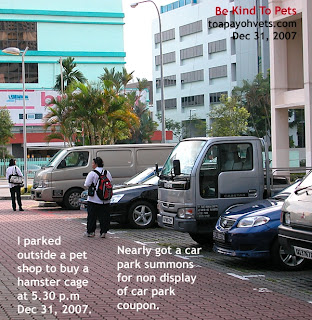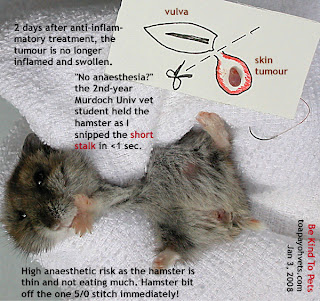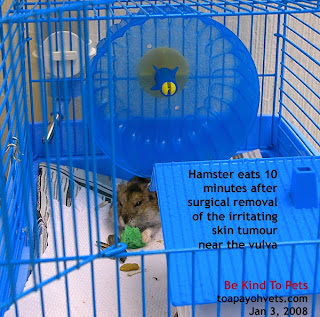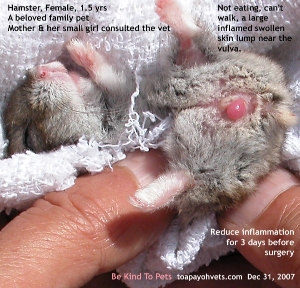She hopped and lumbered as she could not put her right hind leg down normally. She could not sleep well too and had stopped eating. In this case, the risk was extremely high as the hamster was in a very poor body condition.
If I had operated on day 1 so as to reduce veterinary cost and let the hamster go home on the same day, the hamster might not have survived as she was in a poor condition. Never operate on a pet that is not eating for the past few days. Minimise the risk of death due to stress from surgery.
In this case, I rushed to the pet shop to buy a new hamster cage to ward the hamster for observation rather than do immediate surgery.
It was already 5.30 p.m when I reached the pet shop and parked my car without displaying the necessary parking coupons. I saw two wardens approaching. My assistant James said, "The parking wardens are going home, no problem." This was the last day of the year 2007 and most civil servants and other employees work half a day. So James was presuming that the two ladies were going home.
Yet they were wearing the official uniforms and carrying their hand-held ticking PDA as if they were ready for action.
I said, "Looks like they are ready to book vehicles for non-display of parking coupons. You go ahead to buy the hamster cage, water bottle and food I wait a while." The wardens eyed me suspiciously for evading the parking tax and inspected other vehicles. Buying a hamster cage should not take more than 5 minutes. Out of respect for the hardworking wardens, I drove my car out of the parking lot. They might still summon me for illegal parking but these two women explained to me that they had to do their job as there were numerous complaints of illegal parking or parking in reserved car park lots meant for the Housing Development Board residents.
 The
pet shop seller shouted from his back shop. He waved a monstrous
hamster cage with various spiraling colourful orange and blue
plastic tunnels attached and weaving outside the cage from
inside his shop at the back entrance gate.
The
pet shop seller shouted from his back shop. He waved a monstrous
hamster cage with various spiraling colourful orange and blue
plastic tunnels attached and weaving outside the cage from
inside his shop at the back entrance gate.
A complicated model. No sick hamster has time to tunnel and
twist around these channels.
"George, George!!" I shouted from the car park some distance
away. I cursed him for not knowing what I needed. James also did
not know what was wanted. "Just a simple
cage will do!"
George went back to his shop interior. He gave James a
blue cage and I warded the hamster for 3 days. I gave the
hamster a drop of the anti-inflammatory medicine per day for 2
days to bring the redness of the tumour down to normal pink
colour. There was a possibility that she could just die in the
next 2 days as she was not eating.
On the 3rd day, her skin tumour near and to the right of her
vulva was no longer fiery red but a dull pink lump. She was
eating a bit more but her stools were scant. At least there were
around 10 mini-stools. The owner had phoned to enquire about her
health on day 2 and I explained to her that I needed to keep the
hamster for another 2 days.
On the 3rd day, she was operated as this young man of 21 years
old, going into his 2nd year veterinary study at Murdoch
University assisted me. I hope he would learn something about
hamster health and surgery that would be recalled and be useful
during his lectures.
I asked Daniel to restrain the hamster in a white towel as I
took out my surgical instruments.
"No anaesthesia?" the 21-year-old vet student who had
completed his National Service looked at me in surprise.
"The hamster is too weak and may die under anaesthesia," I
explained to the young man who must be thinking that all animal
surgeries need anaesthesia. "Hold the hamster in your
towel to stop her wriggling. It takes less than 1 second to snip
off the tumour." I took a tissue forceps to elevate the tumour
and to show him a small stalk attaching the tumour to the skin.
Then I snip it off at the stalk with a small curved bladed
scissors.
After snipping, blood splashed covering the whole area of more
than 2 sq cm. What to do? This tumour had a large blood vessels
connected to the skin. Would the hamster die? The young student
held the hamster in the towel while I pressed a piece of tissue
paper to stop the bleeding.
Bleeding is quite common in tumour removal of hamsters. They
looked profuse and a lot because the hamster is so small, unlike
a dog. It was not possible to clamp the stalk of the tumour as
the tumour itself was small. The stalk was about 2 mm in width
and because the tumour was no longer inflamed, I could see it.
"The fastest way to wash away the blood was to flush the blood
off under a tap. Just the area of surgery and not the whole
hamster", I said to the student who had not spoken one word
throughout the surgery. He must be wondering how I could wipe
the messy bleeding as the hamster struggled to get free.
I don't know whether the young man learnt anything from this
case as he was starting his second year. Did he learn something
about the anatomy of the hamster's reproductive system.
"Is the tumour an enlarged clitoris?" I asked him.
"No," he said. He was correct. From close observation, it was a
skin tumour very close to the vulval lips but definitely not the
clitoris.
Is he the observant type I wondered? Why was the tumour located
in relation to the vulva?
I asked him to illustrate the process of cutting the tumour as
he saw it so that he could learnt something by participating in
the whole procedure. He was a good illustrator.
The young man drew the tumour at the right side of the vulva as
he recollected.
"No," I tried to be patient and not discouraged him for being
not observant. He had just completed part of his Anatomy
lectures in Year 1 of Murdoch University.
 "The location of the tumour is not correct." I let him see the
wound as I held the hamster. Great patience and time are needed
to mentor the young ones.
"The location of the tumour is not correct." I let him see the
wound as I held the hamster. Great patience and time are needed
to mentor the young ones.
The young man with spiky reddish brown dyed hair and left ear
ring drew the illustration again.
I gave some tips on medical illustration for the final drawing.
You can see his
drawing and the skin tumour in one of the pictures. Not bad for
a beginner but drawing was not his cup of tea.
The mother came on Day 4 to bring the hamster home. "Thank you
very much," she smiled. "The hamster had put on weight!"
"She seems to be very hungry after removal of the tumour," I
said. "Keeps eating.
"She seldom stuff some much food in her cheek pouch at home.
Look, she has over-fill her cheek pouch!" I had not noticed that
but it was true.
How's your little girl? She did not come today. Is she studying in Primary
Two?"
The slim be-spectacled mother in her late 30s smiled again, "My
'little' girl is in Primary Six. Yes, she is short. But there
are some classmates shorter than her!"
So much for my power of ageing of little girls. I better
stick to my core competence of animals.
"The hamster is still lifting her right hind leg while she
walks," the observant mother saw what I did not.
I put the hamster on the examination table. She was really
observant; I must learn from her.
"The hamster is still limping as she could have sprained herself
trying to lick furiously at the tumour." The tumour was on the
right lower side of her vulva and she must have had sprained her
muscles on the right hind leg."

Most likely the hamster would recover and walk normally later.
There was no more bleeding in the small 2 mm skin wound after I
had snipped off the tumour.
All clients want a live pet back after treatment. Death of a pet
ruins a reputation of the veterinarian whatever the
explanations.
Therefore, it is best for a veterinarian not to rush into
surgery when the patient is not in good body condition. The
success rate, sometimes known as "clinical outcome of surgery" is very slim if one
rushes in where angels fear to tread.
Hamsters
are beloved family pets in Singapore. The family of this hamster
is most happy to see her
alive and without the tumour even though her right hind limb
pointed horizontally when she was discharged to go home!
 TOA
PAYOH VETS
TOA
PAYOH VETS
